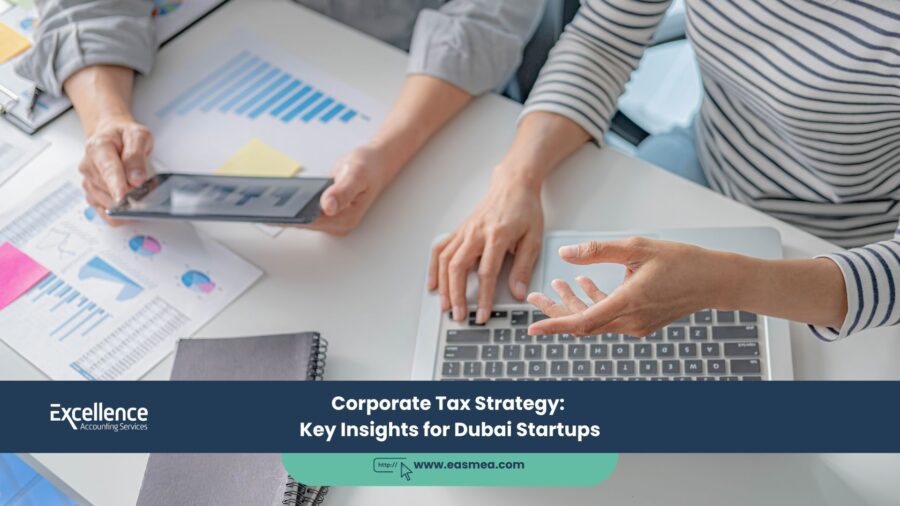Corporate Tax Strategy: Key Insights for Dubai Startups
Dubai’s dynamic and supportive ecosystem has made it a global magnet for ambitious entrepreneurs. Startups here thrive on innovation, agility, and a relentless drive for growth. In this fast-paced environment, founders are laser-focused on product development, market fit, and securing funding. Historically, financial administration, especially taxation, was a distant concern. The introduction of the UAE Corporate Tax regime has irrevocably changed this reality. For a startup, where every dirham of cash flow is critical, Corporate Tax is not just another compliance hurdle; it’s a strategic variable that can impact runway, valuation, and long-term viability.
- Corporate Tax Strategy: Key Insights for Dubai Startups
- The Startup's First and Most Powerful Tax Tool: Small Business Relief (SBR)
- Foundational Blueprint: Early Decisions with Lasting Tax Impact
- Managing Your Burn Rate: A Tax Perspective
- The Non-Negotiable: Building a Culture of Compliance from Day One
- What Excellence Accounting Services (EAS) Can Offer
- Frequently Asked Questions (FAQs)
- Give Your Startup the Financial Edge.
This guide is specifically designed for the founders and leaders of Dubai startups. We will move beyond generic tax advice to provide actionable insights tailored to the unique lifecycle of a new venture—from pre-incorporation costs and initial funding rounds to scaling operations and managing profitability. Understanding these principles from day one is essential to building a resilient, tax-efficient business poised for sustainable success in the UAE’s new economic landscape.
Key Takeaways for Dubai Startups
- Small Business Relief is Your Superpower: For startups with revenue under AED 3 million, this relief can eliminate your entire tax liability, but you must actively elect for it.
- Structure Dictates Your Tax Future: The initial choice of legal structure and jurisdiction (Mainland vs. Free Zone) has profound and lasting tax consequences.
- Record Keeping Starts Before Day One: Many legitimate pre-incorporation expenses can be deducted, but only if you have meticulous records.
- Founder Salaries are a Strategic Tool: Paying yourself a reasonable, documented salary is a deductible expense for the company, unlike drawings or dividends.
- Compliance is a Culture, Not a Task: Embedding financial discipline and using the right tools from the outset will save enormous time and potential penalties down the line.
The Startup’s First and Most Powerful Tax Tool: Small Business Relief (SBR)
For the vast majority of early-stage startups, the most critical provision in the UAE Corporate Tax law is Small Business Relief. This is not an automatic exemption; it’s a strategic choice that can be immensely powerful.
How Does SBR Work?
- The Threshold: If a resident taxable person (your startup) generates revenue of AED 3 million or less in a relevant tax period, it can elect for SBR.
- The Benefit: If you elect for SBR, your taxable income for that period is treated as zero. This means you pay no Corporate Tax.
- The Election: You must formally elect for SBR when you file your tax return. If you don’t, you will be subject to the standard tax calculation, even if your revenue is below the threshold.
Strategic Considerations for SBR
While taking the 0% tax outcome seems obvious, there is a key strategic consideration: tax losses. Startups often incur significant losses in their first few years. If you elect for SBR in a loss-making year, your taxable income is deemed to be zero, and you cannot carry forward those business losses to offset against future profits.
Scenario: Your startup has AED 500,000 in revenue and AED 1,000,000 in expenses, resulting in a AED 500,000 loss.
- Option A (Elect for SBR): Your taxable income is zero. You pay no tax, but the AED 500,000 loss vanishes for tax purposes.
- Option B (Do NOT elect for SBR): Your taxable income is negative (AED 500,000). You still pay no tax, but you can carry forward this AED 500,000 loss to reduce your taxable profits in a future year when your revenue exceeds AED 3 million.
The right choice depends on your growth projections. A professional business consultancy can help you model these scenarios.
Foundational Blueprint: Early Decisions with Lasting Tax Impact
The decisions you make before you even write a line of code or sign your first client have huge tax implications.
1. Choice of Legal Structure and Jurisdiction
The company formation process involves critical choices:
- Mainland vs. Free Zone: A mainland license offers unrestricted access to the UAE market. A Free Zone entity might offer a 0% tax rate under the Qualifying Free Zone Person (QFZP) regime, but the conditions are strict. A startup selling services to mainland clients will likely find its income taxed at 9% regardless, making the perceived tax benefit of a Free Zone illusory for many.
- Sole Establishment vs. LLC: While a sole establishment might be simpler to set up, an LLC provides limited liability, protecting your personal assets—a crucial consideration for any venture. The tax treatment follows the business, not the structure in this case.
2. Documenting Pre-Incorporation Expenses
Founders often spend their own money on market research, legal advice, software subscriptions, and travel long before the trade license is issued. These are legitimate business startup costs. The Corporate Tax law allows for the deduction of these “pre-commencement” expenses, but only if you have flawless records: invoices in your name, bank statements, and a clear link to the business you eventually formed.
3. Shareholder Agreements and Founder Compensation
How will you and your co-founders be compensated? This needs to be decided early.
- Salaries: A formal employment contract and a reasonable, market-rate salary paid through a proper payroll service make the salary a deductible expense for the startup.
- Drawings: Simply taking money out of the business account is considered a distribution of profit (or a loan from the company) and is not tax-deductible.
This distinction is critical for managing your taxable profit.
Managing Your Burn Rate: A Tax Perspective
Every startup manages its burn rate. A smart tax strategy ensures you are correctly accounting for your expenses to maximize deductions and preserve cash.
Common Deductible Expenses for Startups:
- Technology Stack: All your SaaS subscriptions (e.g., AWS, Slack, HubSpot) are fully deductible.
- Marketing and Advertising: Costs for digital ads, content creation, and PR are deductible.
- Workspace Costs: Whether you have a formal office or a co-working space membership, these costs are deductible.
- Professional Fees: Legal, accounting, and consultancy fees are deductible. This includes the cost of a feasibility study.
- Salaries and Benefits: Employee salaries, visa costs, and health insurance are all deductible expenses.
Robust accounts payable processes ensure you capture every single one of these deductions.
The Non-Negotiable: Building a Culture of Compliance from Day One
Many startups fail because they neglect their finances. In the new tax era, this neglect comes with added penalties from the FTA. Financial discipline is a prerequisite for success.
This is where an FTA-accredited, cloud-based accounting platform like Zoho Books becomes an indispensable part of a startup’s toolkit. It is not an expense; it is an investment in scalability and compliance.
For a startup, Zoho Books provides:
- Scalability: It grows with you, from your first invoice to managing complex multi-currency transactions.
- Accessibility: Being cloud-based, you, your co-founders, and your accountant can access real-time financial data from anywhere.
- Clarity: The dashboards give you an instant snapshot of your cash flow, burn rate, and profitability—key metrics for any founder.
- Compliance: It helps you generate IFRS-compliant reports, which are the basis for your tax return, and manage your VAT obligations. A professional accounting system implementation can get you set up in days.
What Excellence Accounting Services (EAS) Can Offer
We understand the unique challenges and opportunities facing startups. Our services are designed to be agile, scalable, and strategic, providing you with the expert financial guidance you need without the cost of a full-time finance team.
- Startup Tax Advisory: We provide specialized Corporate Tax advice for startups, helping you make the right decisions on SBR, structuring, and founder compensation from the very beginning.
- Outsourced Accounting & Bookkeeping: Let us handle your day-to-day finances with our professional accounting and bookkeeping services, so you can focus on building your product and winning customers.
- Fractional CFO Services: Get the strategic financial leadership you need to navigate funding rounds, manage cash flow, and build financial models with our CFO services, available on a flexible, part-time basis.
- Investor Readiness and Due Diligence: We prepare your financials for investor scrutiny, ensuring you are ready for the due diligence process and can present your startup’s financial story with confidence.
Frequently Asked Questions (FAQs)
Yes. Once you have your trade license, you are a legal entity and must register for Corporate Tax with the FTA, regardless of your revenue level. You will then need to file a tax return for each financial period, even if it’s a “nil return” showing no profit and no tax due.
You can only deduct the portion of the cost related to business use. If you use the laptop 80% for business and 20% for personal use, you can only deduct 80% of its cost (usually through depreciation). It is crucial to have a clear policy and documentation for mixed-use assets.
This should be treated as a “loan from a founder to the company.” You need to meticulously document each expense with its invoice and show a corresponding entry in the company’s books as a liability. The company can then reimburse you. It’s far better practice to get a corporate bank account and debit card as soon as possible.
You can elect for Small Business Relief in the first year and pay zero tax. In the second year, your revenue exceeds the AED 3 million threshold, so you will no longer be eligible for SBR. You will have to calculate your taxable income and pay the standard 9% tax on profits exceeding AED 375,000.
Not automatically. The 0% tax rate in Free Zones only applies to “Qualifying Income” for “Qualifying Free Zone Persons.” If your tech startup’s customers are on the mainland, that income is generally taxable at 9%. The decision should be based on a holistic view of regulation, location, and setup costs, not just a perceived tax benefit.
No. These are “pre-incorporation” or “pre-commencement” expenses. Provided you have clear invoices and proof of payment, and these costs directly relate to the business that was eventually set up, they can be capitalized and deducted over time once the business starts trading.
The loan principal itself is not income. However, the interest you pay on the loan is a tax-deductible expense. This reduces your taxable profit. Be aware of the “interest capping” rules, which may limit the amount of interest you can deduct if your debt levels are very high relative to your earnings.
Yes. The tax losses you incur in the early years can be carried forward indefinitely to offset against taxable profits in future years. This means when your startup becomes profitable, you can use these past losses to significantly reduce your tax bill. This is a key reason why you might choose not to elect for SBR in a loss-making year.
The requirement for a statutory external audit depends on the rules of your specific jurisdiction (some Free Zones require it) or if you meet certain thresholds. However, even if an audit is not mandatory, preparing audit-ready, IFRS-compliant financial statements is a best practice and essential for tax filing and attracting investors.
This is a “related party transaction” and is subject to transfer pricing rules. The amount your Dubai startup pays the co-founder’s UK entity for these services must be at “arm’s length”—the same price you would pay an unrelated third party for similar services. You must have a formal service agreement and documentation to justify the price. A business valuation or benchmarking can help support this.
Conclusion: Build a Tax-Smart Startup from the Ground Up
For a Dubai startup, Corporate Tax is not a burden to be dealt with later; it is a strategic element that should be woven into your business plan from the very beginning. By understanding the levers available to you—particularly Small Business Relief—and by making informed decisions about structure, compensation, and record-keeping, you can protect your cash flow, enhance your investor appeal, and build a financially robust company. A proactive, informed approach to tax is a powerful co-founder for your success.




